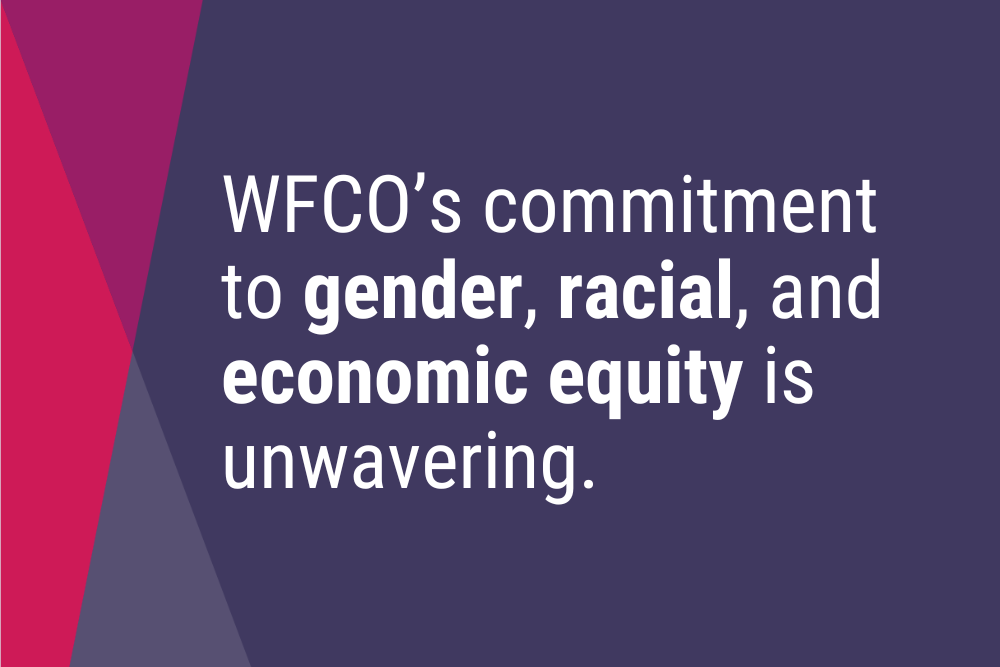
Our Collective Work Is More Important Than Ever
2024 election outcomes: We are ready to face the challenges of these new realities in partnership with you
As we all take some time to process the shock and complete meaning of the 2024 election outcomes, we know many of you feel fearful about what the future holds for gender, racial, and economic equity. You are not alone.
The Women’s Foundation of Colorado shares your deep concern about the possibility of threats to safety and equitable rights for women, LGBTQ+ people, people of color, and immigrants. According to Pew Research, nearly half of registered voters expect the president-elect’s policies to make things worse for women.
Our collective work is more important than ever
While we are gravely disappointed by what this election signifies about the growing misogyny in our country, we are hopeful that the millions of voters who showed their support for the issues impacting women and families will not be deterred in continuing to stand, speak, and act. Our collective work is more important than ever.
We are grateful for our community partners who work day in and day out to create a better future for Colorado women and their families. Their leadership informs and inspires our work. The generosity of our donors has always been and will continue to be our most important tool in advancing equity. Most importantly, we thank every individual who worked for democracy and voted with women in mind.
Our mission, vision, and values are unwavering
Many have asked, “Will the focus of your work change?” Our vision, mission, and values are unwavering. Our board and staff are committed to continuing to use every tool we have to protect women’s freedom and progress. We are ready to face the challenges of our new reality with fervor and courage in partnership with you.
The Women’s Foundation of Colorado plays a critical role in ensuring the progress we make is accessible to every woman across our state and that gaps in resources close. We will persevere in our work with and for those who are pushed to the margins and denied access to economic security because of their identities.
Colorado stands strong for women, LGTBQ+ people, child care, and health care
Here in Colorado, we have reasons for hope. While the final counts are still being tallied, we believe that at least half of the 100 members of the Colorado General Assembly will be legislators who are women*. This would increase the number of women in office and likely mean that Colorado is one of the states with the most women in our House.
Voters passed measures to protect our rights to make our own reproductive health and abortion care decisions and freedom to marry the person we love. They ensured that Colorado remains a leading state for women.
All state ballot measures that The Women’s Foundation of Colorado supported passed.
- Colorado voters decisively protected marriage equality, enshrined legal abortion in the state constitution, and said yes to statewide mental health services and healing for children; veterans; underserved young people and victims of domestic violence, sexual assault, child abuse; and other violent crime.
In local measures, three out of the four ballot measures we took positions on passed.
- Voters in La Plata and Grand counties supported child care and affordable housing. Denver residents approved helping Denver Health cover the costs of patients who cannot pay their bills.
- However, Denver voters likely did not pass 2R for affordable housing (final numbers are still being counted). Housing affordability is an urgent priority in communities throughout the state. WFCO and our partners will continue working to increase access to stable, safe, and affordable housing.
Let’s stay strong and support one another
We understand the stress and anxiety are high and the pressures of what lies ahead may feel daunting. Let’s stay strong and support one another as we process and plan to move forward.
As a 501c3 tax exempt organization, The Women’s Foundation of Colorado applies a data-driven, nonpartisan approach to public policy focusing on the issues that impact women, gender-expansive people, and their families.
*The makeup of the Colorado General Assembly won’t be confirmed until early 2025.

